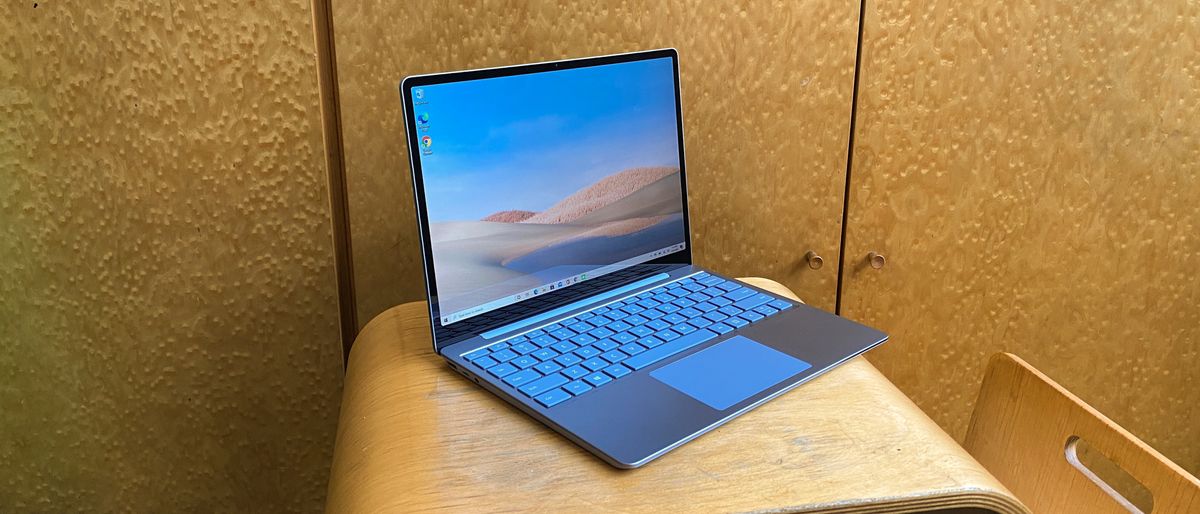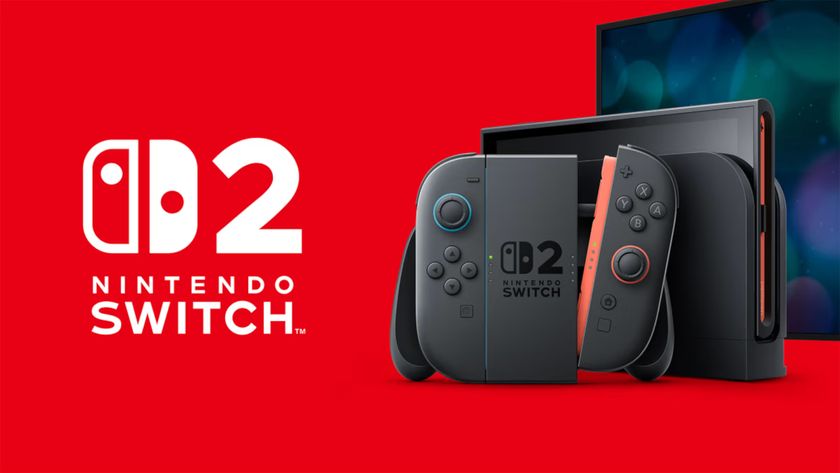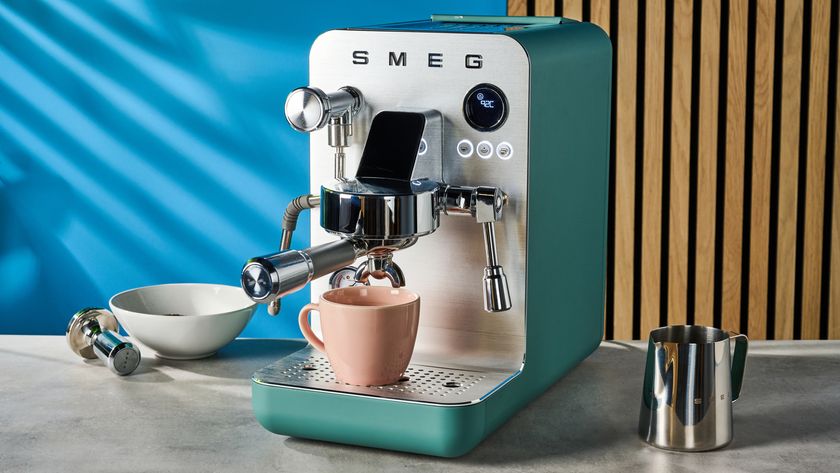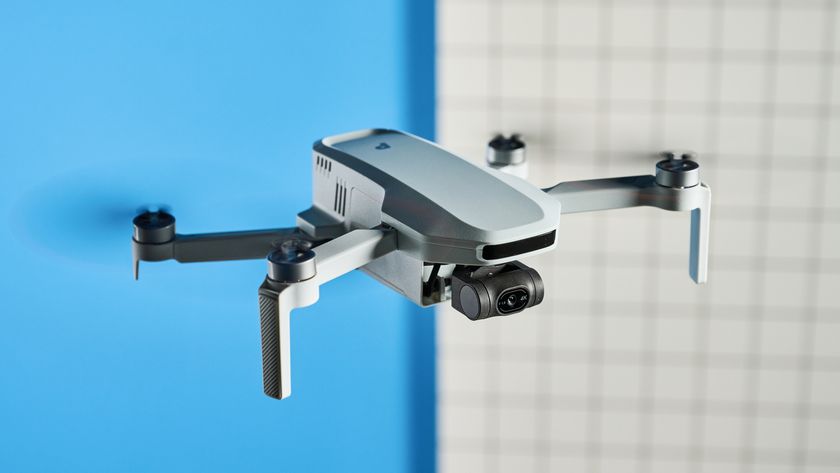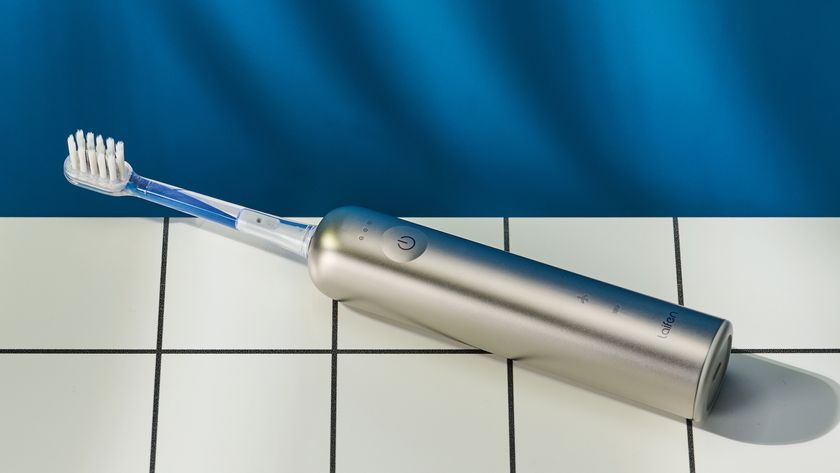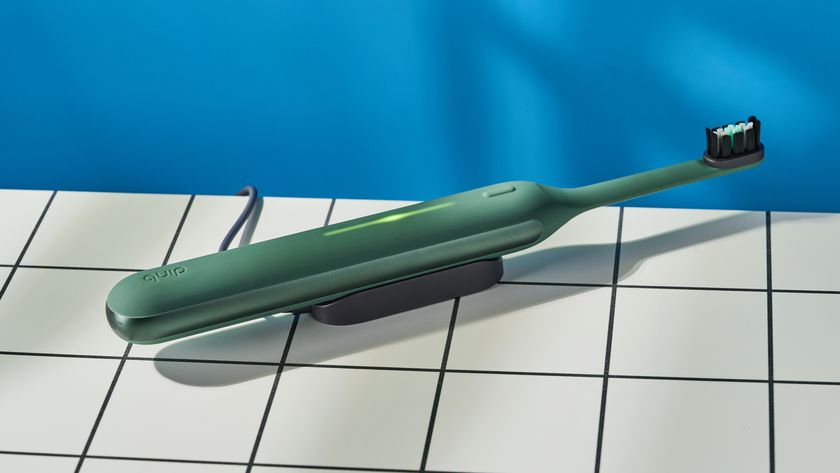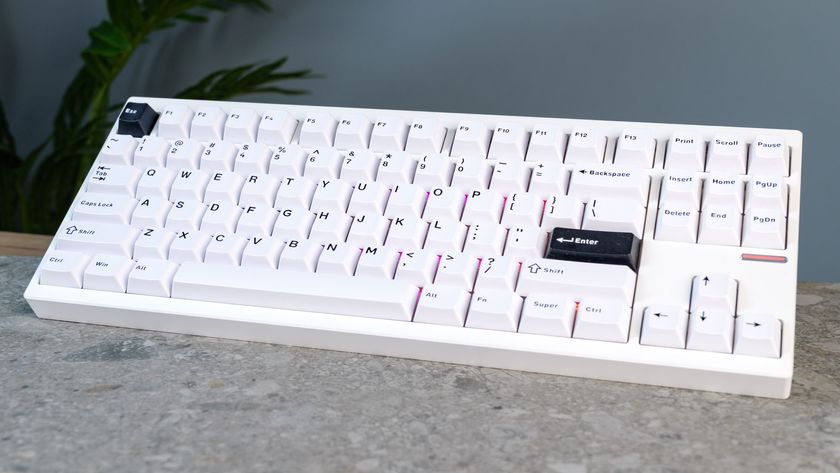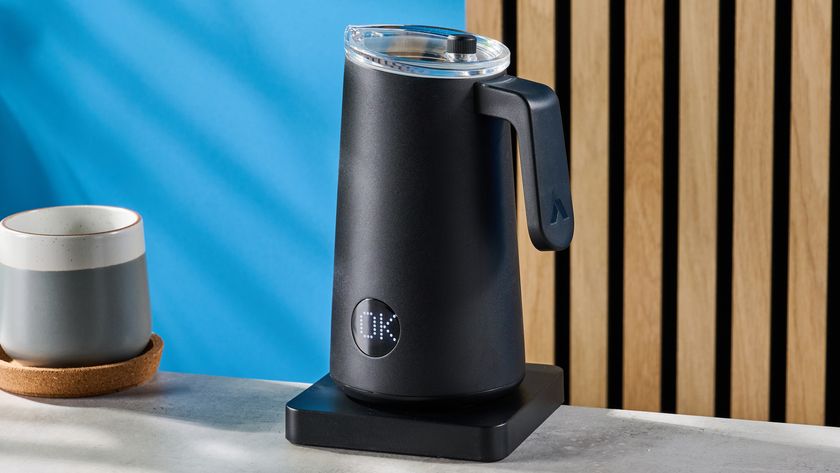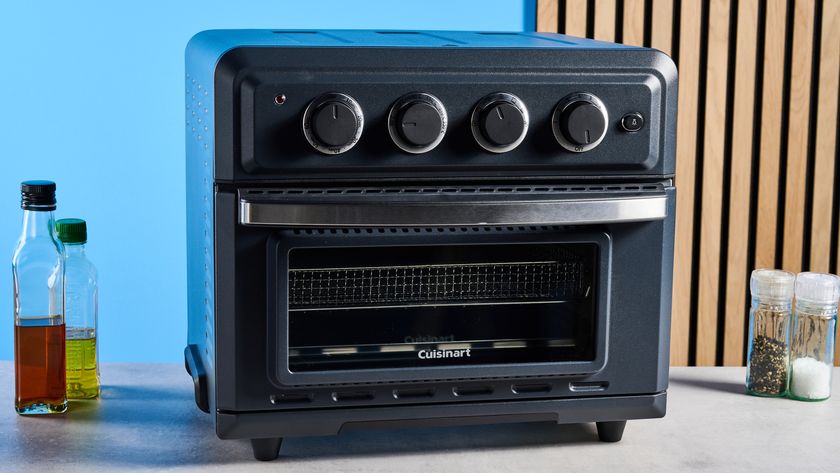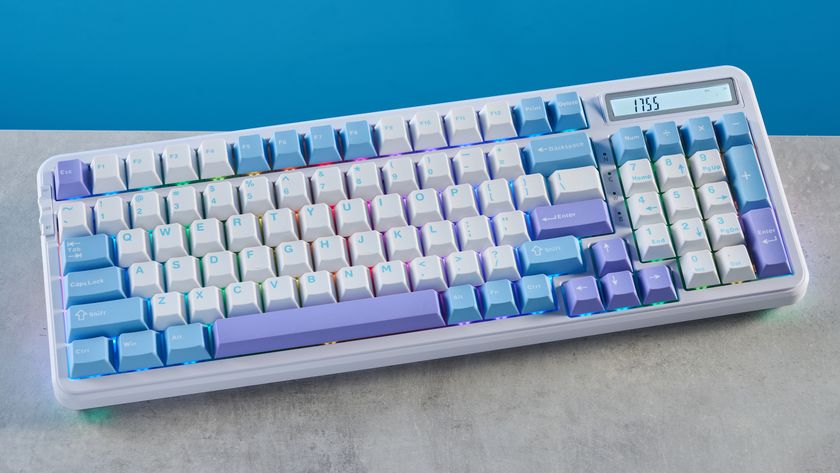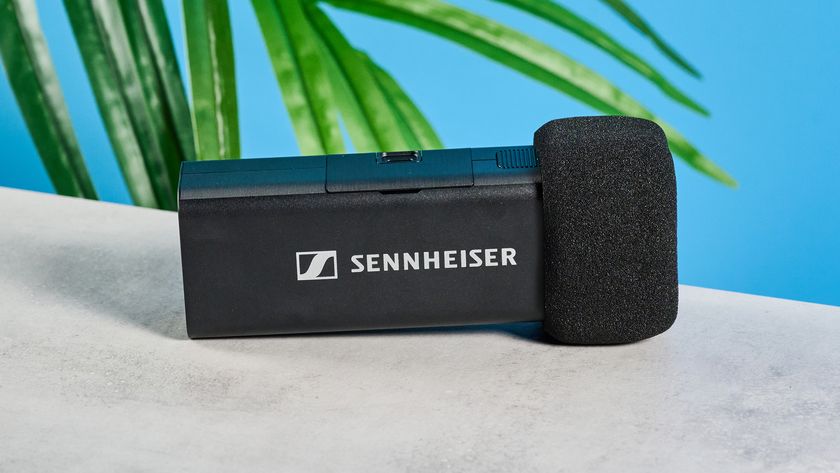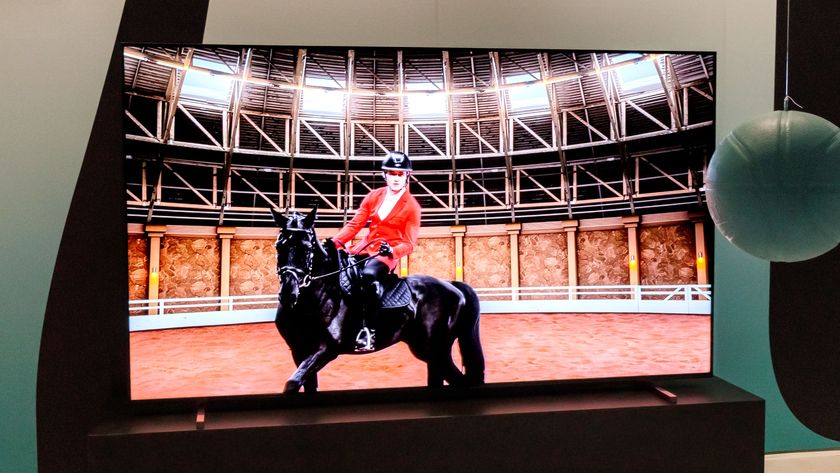Tom's Guide Verdict
The Surface Laptop Go looks like a Surface, but it doesn't impress like some of its bigger brothers.
Pros
- +
Elegant aluminum lid and deck
- +
Thin bezels and 3:2 display
- +
Wonderful typing experience
- +
Both USB-C and USB-A ports
Cons
- -
Highly disappointing battery life
- -
Display could be brighter
- -
Gets a little warm
Why you can trust Tom's Guide
The Microsoft Surface Laptop Go is made for a wide audience with modest needs, who want an elegant laptop that doesn’t cost four figures. But it still looks a lot like a premium laptop, thanks to its aluminum lid and keyboard deck, as well as thinner bezels than you find in Apple’s laptops.
You won't call the Surface Laptop Go a powerhouse (at any configuration), but its general performance gives enough speed for general multitasking. Plus, its port selection strikes a great balance between modern and legacy ports. Unfortunately, the Surface Laptop Go’s battery life is shorter than expected, and its display could stand to be a bit brighter, which keeps this system from earning a spot on our best laptops list.
- The best college laptops, ranked
- Dell XPS 13 vs MacBook Pro: Which laptop is best?
Oh and one note: this Surface Laptop Go review uses benchmarks taken after removing S Mode, because we can't run any of our tests in that situation — as none of our tests are in the Windows App Store.
Microsoft Surface Laptop Go: Price and availability
The Surface Laptop Go starts at $549 with a Core i5 processor, 4GB of RAM and 64GB of eMMC storage (likely slower than the SSDs in the other models). This model doesn't give you the fingerprint reader seen in the high-end models.
Starting Price: $549
CPU: Intel Core i5-1035G1
GPU: Intel UHD Graphics
RAM: 4GB / 8GB
Storage: 64GB (eMMC), 128/256GB (SSD)
Display: 12.4-inch PixelSense touchscreen, 1536 x 1024
Battery: Estimated 13 hours
Size: 10.95 x 8.1 x 0.62 inches
Weight: 2.45 pounds
We tested the maxed out Surface Laptop Go, which costs $899 and packs an Intel Core i5-1035G1 processor, 8GB of RAM and a 256GB SSD. But when that model is so much pricier than the entry-level model, it may not be the version most will be looking to buy.
I'd gently nudge folks to the $699 Surface Laptop Go, which has the same CPU, but with 8GB of memory and 128GB of SSD storage.
Microsoft Surface Laptop Go: Design
While the Surface Laptop Go is cheaper than the Surface Laptop, it sure doesn’t looks like it (in most places). Its machined aluminum lid and keyboard deck — seen here in a sleek Ice Blue — give it the air of class you see in its siblings. Microsoft also sells it in Sandstone (sort of like a pink or rose gold) and Platinum (silver, essentially). They're all nice, light and elegant hues, but I'd probably go with Ice Blue.
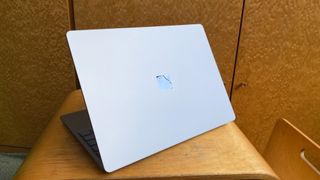
On the undercarriage, Microsoft is using a polycarbonate composite resin system, that includes glass fiber and (for an eco-friendly touch) 30% post-consumer recycled content. It's got such a nice feel that I don't feel irked it's not an all-aluminum chassis like the Surface Laptop 3.
Weighing in at 2.5 pounds and measuring 0.6 inches thick, the Surface Laptop Go is a little thicker than the Asus Zenbook 13 UX325EA (2.5 pounds, 0.5 inches) and slightly heavier than the Google Pixelbook Go (2.3 pounds, 0.5 inches).
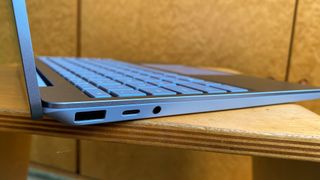
The Surface Laptop Go packs both USB-A and USB-C ports, plus a 3.5 mm headphone jack on its left side. I'd normally think that was a little light, but on the right side, you've got a Surface Connect port for powering the Surface Laptop Go, meaning your USB-C port is free for whatever accessories you want to add.
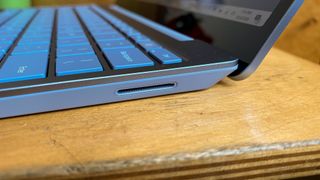
The Pixelbook Go only has dual USB-C's, and you're going to use one for charging. The ZenBook 13 offers a strong selection, with one Type-A port, a microSD card slot, HDMI, dual Thunderbolt 4 ports, but it lacks a headphone jack.
Microsoft Surface Laptop Go: Display
The Surface Laptop Go's 12.4-inch 1536 x 1024-pixel display is a mixed bag. Its 3:2 aspect ratio is great for reading the web and working in documents. Unfortunately, its sub-Full HD resolution, which is 148-ppi, isn't as pixel-dense as the 166-ppi Pixelbook Go and Asus ZenBook 13. If you squint, you may be able to tell that this display isn't as sharp as your average Full HD display, but I'm not sure many will notice without looking for it.
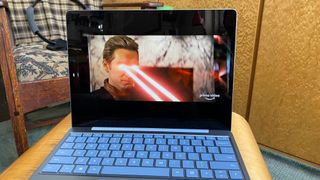
Watching a clip from The Boys season 2 on the Surface Laptop Go, I noticed that the show's slightly-tweaked colors reproduced correctly. Homelander's red-white-and-blue cape appeared with the correct darkness, and the beams shooting from his eyes hit with a proper mix of red and white. But as I took photos of the Surface Laptop Go for this review, I noted a lot of myself in the reflections from the screen.
According to our Klein K10-A colorimeter, the Surface Laptop Go produces 103% of the sRGB spectrum, a respectable rate that beats the 91% mainstream laptop average. It's slightly below those of the Zenbook 13 (108%), Pixelbook Go (108%), but not to a point where I'd deduct points.
The Microsoft Surface Laptop Go doesn't really match up on brightness, maxing out at 319 nits, which isn't as bright as the 370-nit Zenbook 13 or the 368-nit Pixelbook Go. Still, it beats the 303-nit mainstream category average by a slight margin. That being said, if this panel got a bit brighter, I'm sure the aforementioned reflection wouldn't have been so noticable, and that it would have a wider range of viewing angles, as the panel darkens at around 35 degrees to the left and right.
The Surface Laptop Go's 12.4-inch touchscreen display provided snappy reaction times to my taps and swipes as I adjusted windows and opened the Start menu and Action Center.
Microsoft Surface Laptop Go: Keyboard and touchpad
While its keys are a little smaller than you get with most other laptops, the Microsoft Surface Laptop Go offers a joyous typing experience. Each key quietly clicks down under pressure, making the Surface Laptop Go perfect for typing around others. The keys offer a pleasant, but subtle, amount of feedback as well.
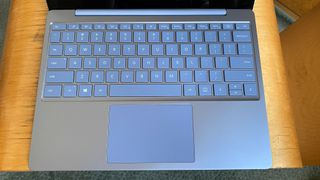
Taking the Surface Laptop Go for a spin on the 10fastfingers.com typing test, my first score of 69 words per minute was a little below my 80wpm average. But with a little practice, I got pretty close, clicking at 77 words per minute. I attribute the learning curve to the size of the keys, which are 0.6-inch squares, whereas I'm primarily used to typing on the 0.7-inch square keys of the 13-inch MacBook Pro.
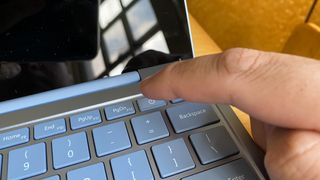
The Surface Laptop Go's 3.9 x 2.6-inch trackpad accurately registered my input as I navigated around the desktop. It also speedily responded to Windows 10's navigation gestures.
Microsoft Surface Laptop Go: Audio
The Surface Laptop Go's speakers (which emit sound from under the keyboard) sound pretty great, and much better than you'd expect from audio coming through your keys. As I listened to Rage Against the Machine's "Guerilla Radio," and the rest of the Tony Hawk's Pro Skater 1+2 soundtrack, I noticed that Zack de la Rocha's vocals came through clear, while the guitar riffs, drums and synths all sounded accurate and correct. The Surface Laptop Go also produces solid bass, as I heard on A Tribe Called Quest's "Can I Kick It?"
The Surface Laptop Go gets loud enough for my medium-sized home office, but even at max volume I couldn't hear much sound in adjacent rooms.
Microsoft Surface Laptop Go: Performance
I got some decent multitasking speeds out of the Surface Laptop Go's 10th Gen Intel Core i5-1035G1 processor and 8GB of RAM. When I split the Surface Laptop Go's screen between a dozen Chrome tabs and a 1080p YouTube video, everything stayed snappy and responsive, even as I played an album from Spotify in the background. That being said, those who buy the entry-level 4GB Surface Laptop Go should probably get ready to manage their tabs a little more than I did.
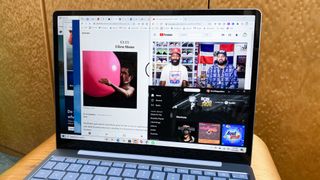
On the Geekbench 5 overall performance benchmark, our Surface Laptop Go notched a middling 3,117, which is less than the 3,662 mainstream notebook average, but beats the 1,356 from the Google Pixelbook Go (Intel Core i5-8200Y, 8GB of RAM). The more-expensive Asus Zenbook 13 UX325EA (11th Gen Core i7-1165G7 and 16GB of RAM) did much better, landing a score of 5,084.
The 256GB SSD in the Surface Laptop Go — which is half of why you're paying more for the model we tested — copied 25GB of various multimedia and productivity files in 1 minute and 41 seconds, for a rate of 266.31 MBps. That's well below the 411.6 MBps mainstream category average, and speedy 1TB M.2 PCI 3.0 SSD in the Asus Zenbook 13 (583.6 MBps).
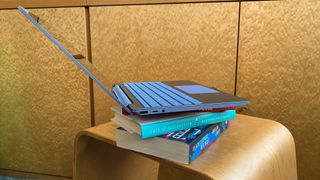
The bad news continued on our Handbrake video test, where we time how long a laptop needs to convert a 6.5GB 4K video to 1080, with the Surface Laptop Go taking 25 minutes and 55 seconds, more than 25% longer than the 20:19 mainstream laptop average.
On the 3DMark Fire Strike graphics test, the Surface Laptop Go's integrated Intel UHD graphics chip (an aging component) performed about where I expected, with a 1,229 that's a fraction of the 3,228 mainstream laptop average. The new Intel Xe graphics helped the Asus Zenbook 13 (4,407) do better.
When we ran Sid Meier's Civilization VI: Gathering Storm on the Surface Laptop Go, it ran at an unplayable 9 fps, and that's at the laptop's 1536 x 1024 native resolution, less than the 14fps category average (also below our 30 fps smoothness threshold). The Asus Zenbook 13 (21 fps) did better (but not good enough) at 1920 x 1080p.
Microsoft Surface Laptop Go: Battery Life
I've got some bad news for those wanting to spend lots of time with the Surface Laptop Go untethered. While Microsoft rates the Surface Laptop Go for up to 13 hours of life on a charge, the Tom's Guide web surfing battery test drained it in 7 hours and 31 minutes. That's about an hour and a half less than the 8:42 mainstream laptop average. The Asus Zenbook 13 (13:47) and Google Pixelbook Go (11:29) lasted longer.
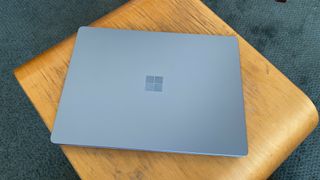
Microsoft's claims of better battery life involve the Surface Laptop Go being in Windows 10 S Mode, and involve a varied set of usage, including standby mode.
Microsoft Surface Laptop Go: Webcam
The Surface Laptop Go's internal 0.9-megapixel/720p webcam is about average for the world of laptops. You'll look better well-lit, but photos I shot in both natural light and in my secluded desk space had the same grainy quality, where I only clearly saw errant split ends than any detail in my actual hair. My skin tones are reproduced relatively clearly in both shots.
My main frustration is that it doesn't have the 1080p webcam that's inside the Surface Go. I don't know why Microsoft made this decision — the Surface Go is cheaper — but the Surface Laptop Go has thinner bezels, and it might have been harder to fit a better webcam in.
Microsoft Surface Laptop Go: Heat
After we streamed 15 minutes of Full HD video on the Surface Laptop Go, it started to get a little warm. Our heat gun registered temperatures on its keyboard and underside (96 and 116 degrees Fahrenheit, respectively), that exceeded our 95-degree comfort threshold. Its touchpad (82.5 degrees) stayed cool.
Microsoft Surface Laptop Go review: Verdict
I love the Surface Laptop Go as the sleek mid-range laptop that it almost is. You can get its great keyboard, elegant chassis and decent performance at a respectable price — if you choose the $699 model. Its display isn't bright enough, nor does its battery last as long, though, for the $900 model to make sense for most folks.
Those who are looking to spend that much should check out the $949 Asus ZenBook 13 UX325EA, which beats the Surface Laptop Go on performance and endurance, giving you the proper bang for your buck (unless you want a headphone jack).
All in all, this Microsoft Surface Laptop Go review gets a lot of things right, but the battery life could be better. It’s a good productivity laptop for a reasonable price.
What's next for the Surface Laptop Go? Read up on the Surface Laptop Go 2 and its rumored specs.

Henry is a managing editor at Tom’s Guide covering streaming media, laptops and all things Apple, reviewing devices and services for the past seven years. Prior to joining Tom's Guide, he reviewed software and hardware for TechRadar Pro, and interviewed artists for Patek Philippe International Magazine. He's also covered the wild world of professional wrestling for Cageside Seats, interviewing athletes and other industry veterans.
